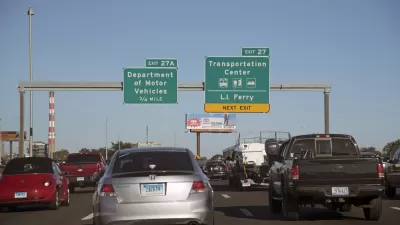A case study of media coverage in Connecticut finds a double standard between the CTFastrak and Interstate 84 projects.
Joseph Cutrufo examines the discrepancies in the scrutiny afforded two transit projects in Connecticut: CTfastrak and the widening of Interstate 84 in Waterbury. Cutrufo begins by noting the similarities between the two projects: "They’re both major transportation projects aimed at improving mobility, both became visible to the traveling public in the spring of 2015, and both cost hundreds of millions of dollars."
Yet despite those similarities, "it seems that the Connecticut Department of Transportation is being asked to justify the amount it’s spending on the bus rapid transit service, while spending on major highway projects seems to be accepted without much media scrutiny."
Seemingly opposed to the CTFastrak, is the Hartford Courant, which has reported and editorialized about a large jump in costs for the system. Cutrofo, however, thinks the focus on increased costs misses much of the point:
"It’s a substantial increase, but that original subsidy estimate is eight years old (though ConnDOT Commissioner Redeker probably shouldn’t have been 'quoting the $10 million figure with no caveats or disclaimers' as recently as 2014 — good sleuthing by the Courant). Since then, ConnDOT had expanded its service plan, which makes the system more useful and convenient, which in turn drives up ridership. And it’s working. Average daily ridership, according to the same article, is over 16,000, about 50 percent higher than the expected 11,200 daily riders."
The article includes by noting the lack of analysis or critique for the 2.7-mile widening project on I-84. In effect, according to Cutrofo, the media and the public declare the following: "No more bottleneck? By any means necessary! More money to subsidize bus riders? Let’s see your numbers."
FULL STORY: Scrutiny for Transit Projects, but Not for Highways

Alabama: Trump Terminates Settlements for Black Communities Harmed By Raw Sewage
Trump deemed the landmark civil rights agreement “illegal DEI and environmental justice policy.”

Study: Maui’s Plan to Convert Vacation Rentals to Long-Term Housing Could Cause Nearly $1 Billion Economic Loss
The plan would reduce visitor accommodation by 25% resulting in 1,900 jobs lost.

Planetizen Federal Action Tracker
A weekly monitor of how Trump’s orders and actions are impacting planners and planning in America.

Waymo Gets Permission to Map SF’s Market Street
If allowed to operate on the traffic-restricted street, Waymo’s autonomous taxis would have a leg up over ride-hailing competitors — and counter the city’s efforts to grow bike and pedestrian on the thoroughfare.

Parklet Symposium Highlights the Success of Shared Spaces
Parklets got a boost during the Covid-19 pandemic, when the concept was translated to outdoor dining programs that offered restaurants a lifeline during the shutdown.

Federal Homelessness Agency Places Entire Staff on Leave
The U.S. Interagency Council on Homelessness is the only federal agency dedicated to preventing and ending homelessness.
Urban Design for Planners 1: Software Tools
This six-course series explores essential urban design concepts using open source software and equips planners with the tools they need to participate fully in the urban design process.
Planning for Universal Design
Learn the tools for implementing Universal Design in planning regulations.
Caltrans
Smith Gee Studio
Institute for Housing and Urban Development Studies (IHS)
City of Grandview
Harvard GSD Executive Education
Toledo-Lucas County Plan Commissions
Salt Lake City
NYU Wagner Graduate School of Public Service




























